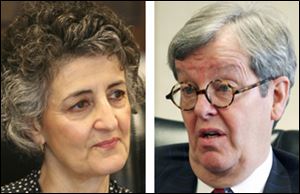
Lucas County panel charts plan to adopt home rule
Executive council sought to streamline leadership
6/23/2011
Lucas County in Northwest Ohio.

Panel leaders Olivia Summons and Tom Killam said local economic woes illustrate the need for change.
After eight months of investigation, a self-appointed citizens' committee on Thursday launched a proposal to reorganize Lucas County government in a way that its leaders hope will lead the region out of a long-running economic slump.
The Lucas County Citizen Review group unveiled a county charter to be placed on the ballot in November, 2012, in the lobby of the Fifth Third Center in One Seagate in downtown Toledo.
If voters agree, the new charter would make Lucas County a home-rule county and replace the traditional structure of 11 independently elected county officials with an elected executive and nine-member county council with legislative powers.
Olivia Summons, a co-chairman of the advisory panel with Toledo lawyer Thomas Killam, said the need for county government reform is spelled out in the county's economic statistics.
"This county, our region, according to all reports and as all of us know as citizens, has a high unemployment rate. Housing sales are not what they should be. We are rated very low in all the assessments the various groups do," said Ms. Summons, who is public relations director for PBF Toledo Refining Co.
"Changing government gives citizens more flexibility, it gives them still a say in election of our elected officials, but it's a different configuration which will help eliminate duplication, increase efficiency, encourage regional collaboration, and this is a step to try to help this region," Ms. Summons said.

The proposed charter creates a nine-member council of part-time councilmen who would be paid $30,000 a year for four-year terms. Three would be elected at-large, and six would come from districts.
A county executive would be elected to a four-year term and would replace the current three-member board of county commissioners. The county executive would appoint officials who would take over the duties of most of the elected row offices.
The executive would appoint a chief fiscal officer who would take on the responsibilities of the county auditor, recorder, and treasurer.
The executive would also appoint a sheriff, a coroner -- to be known as the medical examiner -- and a county engineer, all of which are now elected positions. The elected clerk of courts would be appointed by the judges of the Common Pleas Court, and all his noncourt-related duties, such as auto and watercraft titles, would be shifted to the chief fiscal officer.
Of all the row offices, only the county prosecutor would continue as an independently elected official. The committee said the prosecutor has the responsibility to give legal advice and also to investigate the government, requiring independence.
The county council would appoint an internal auditor to report to an audit committee composed of the county executive, the chief fiscal officer, a member of the county council, and two county citizens.

County commissioner Pete Gerkin, left, wants public discussion of the plan. Retired judge and panelist Andy Devine warned of trying to do too much.
More efficient
The new form of government is expected to be more efficient. Officials said they believe a county executive would be more accountable and have more power to implement a visionary agenda. They said the current system, with its 11 elected officials, contributes to a lack of responsibility for solving county problems.
Lucas County would be the third of Ohio's 88 counties to take over home rule from the state. Summit County established a county executive in 1979, along with a county council, while retaining an elected county fiscal officer, clerk of courts, prosecutor, engineer, and sheriff.
Cuyahoga County last year became the second to elect a charter government, with a county executive, a county council, and an elected county prosecutor.
As evidence that charter government could be cheaper than traditional county government, the study committee compared the cost of government in Summit and Lucas counties.
According to the study, Summit County's 2011 budget cost $192 per resident, compared with $241 per resident in Lucas County. Lucas County's population is 441,815, compared with 541,781 in Summit County. The median income in Summit County was $38,940 per person, compared with $32,837 in Lucas County. Lucas County government has approximately 1,300 full-time employees, compared with 1,040 in Summit County.
CURRENT COUNTY GOVERNMENT:
Elected board of county commissioners (three members), auditor, clerk of courts, coroner, engineer, prosecutor, recorder, sheriff, and treasurer.
Legislative power retained by state government.
PROPOSED COUNTY REORGANIZATION:
Elected county executive, with power to appoint a chief fiscal officer, medical examiner, and sheriff. The executive would be paid $170,000 and serve a four-year term.
Elected council with six district members and three at-large members with legislative power to approve budget and enact ordinances, including taxation. Council members would be paid $30,000.
Elected prosecutor.
Appointed clerk of courts, by judges of Common Pleas Court.
TIMETABLE:
November, 2012: election on ballot question is held.
November, 2014: county executive and council members are elected (if voters approve ballot question in 2012).
January, 2015: newly elected officials take office, replacing former elected officials.
The study said it didn't have enough information to attribute the lower costs to the difference in government structure, but didn't rule it out.
"It does raise the question with which this community must grapple in the coming months," the study said.
Pete Gerken, president of the Lucas County board of commissioners, accepted a copy of the study at Thursday's news conference.
Mr. Gerken said he wants to "see what value it has for us, and then there should be some community discussion. Whether it's a smart way to go yet I think is still a work in progress. I've had the fortune to speak with some of the people in Cleveland there on the county council and they're still feeling their way. We have now the benefit of watching one of these things develop for the next year."
He also said that corruption scandals led to the charter elections in Summit and Cuyahoga county, unlike Lucas County.
Devine's insight
Retired Lucas County Juvenile Judge Andy Devine served on the study committee and said he supports its conclusions, with reservations. He said he doesn't see the advantage of doing away with most of the row offices, and said there will be so much resistance to eliminating those offices that it could defeat the important part of the reform -- creating a county executive and a legislative function.
"It jeopardizes the reorganization of the board of commissioners," said Mr. Devine, himself a former county commissioner.
"I think we should follow Summit County's lead on this," Mr. Devine said. "I'm not really opposed to this complete reorganization, but I'm saying you're jeopardizing its passage by taking on too much too soon."
Start in 2015
As outlined by Ms. Summons and Mr. Killam to The Blade on Wednesday, 2015 is the earliest that Lucas County's new government could start to function, assuming it meets voter approval in 2012.
They ruled out trying to get on the ballot this November because the deadline to turn in more than 14,000 valid voter signatures is July 1, and it would cost up to $80,000 for a professional firm to collect the signatures in such a short time.
Even if the signatures could be collected over the next week, that leaves only a few months to establish a campaign committee and raise the money to promote passage in time for the election.
"The most important piece is the public education component. People have to understand why this is important," Ms. Summons said.
Mr. Killam said that under state law such a question can only go on the ballot in a general election, and county officials can only be elected in an even-numbered year. That means the question would go on the November, 2012, ballot, and if the reorganization plan wins voter approval, the new county officials would be elected in 2014, and the new officials would take office in January, 2015.
"We don't think we can raise the money and organize the group for this fall," Mr. Killam said.
He said the Citizen Review Committee is ready to hand over the responsibility for the next phase, voter education, to another group, but "there's nobody to hand the ball off to."
The Citizen Review Committee was based on the model of the old Corporation for Effective Government, which was paid to conduct studies before it went defunct about a decade ago. Mr. Killam and Ms. Summons, as well as Marna Ramnath, the chairman of the study committee itself, as well as their committee members, worked as volunteers who put in a combined 2,500 hours of time.
The committee raised about $35,000 for their work and received in-kind support from the University of Toledo in the form of a research assistant and facilities to hold their meetings, Ms. Summons said.
The current effort came about when Ms. Summons and Mr. Killam launched the study last July, with acknowledgement of the value of the study from the county commissioners.
The study committee -- which interviewed 28 local government officials -- had 27 members and the advisory panel had 19 members. In addition, the group had 14 corporate sponsors.
Contract Tom Troy at: tomtroy@theblade.com or 419-724-6058.